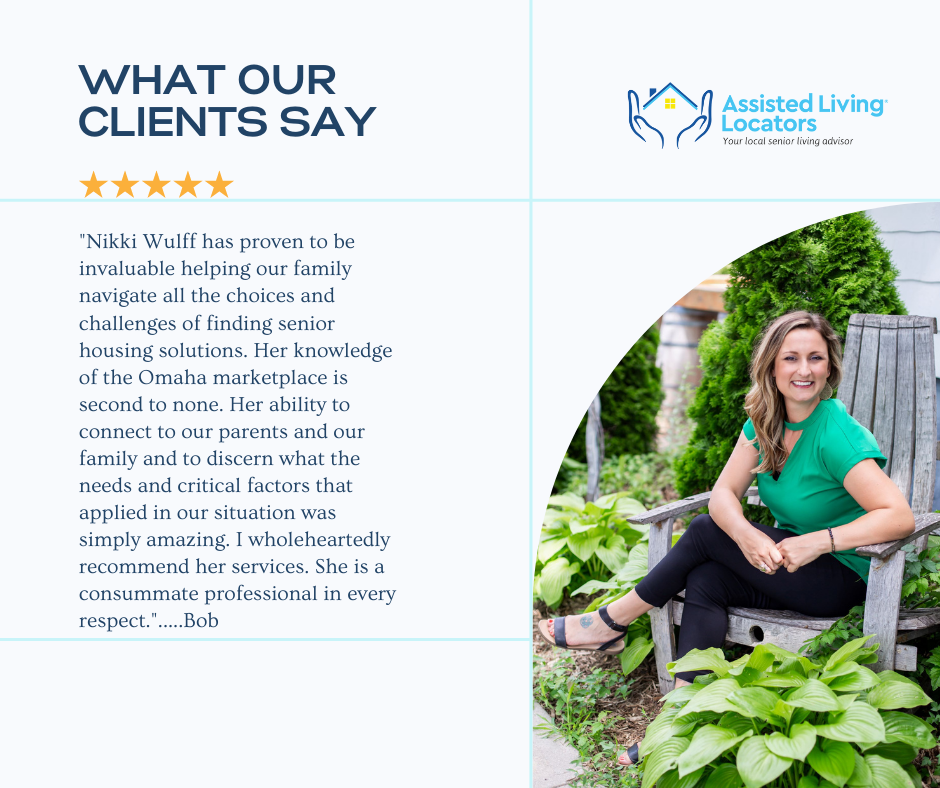Comparing Senior Living Options
Assisted Living Locators
Jun 09, 2021
Nebraska - Eastern Region
Independent Living
Independent Living communities offer seniors all of the benefits of an apartment-style home without the responsibility of daily chores or upkeep. These types of communities are appropriate for seniors that can manage their daily basic living needs on their own. Most communities offer an assortment of services, ranging from one or more meals per day, housekeeping, laundry, apartment maintenance, and transportation services. This is generally a good option for seniors that want interaction and socialization with other seniors, and dont need daily care assistance. Many Independent Living communities also offer wellness programs, a range of leisure activities, beauty services, and even classes in a variety of topics.
In-Home Care
In-home care, is supportive care provided in your home. This care is also sometimes referred to as companion care or non-medical in-home care. Non-medical in-home care providers may offer assistance with dressing, bathing, grooming, meal preparation, transportation, medication management, companionship and light housekeeping.
Assisted Living Homes and Communities
undefined
Assisted Living is an excellent option for seniors requiring supervision or assistance with their activities of daily living (ADLs). Assisted living is a catch-all phrase that describes both assisted living homes and assisted living communities.
The trained staff at Assisted Living facilities provide 24 hour assistance with activities of daily living, and may include the administration or supervision of medication, or personal care services such as bathing, dressing, toileting, shaving, nail care, oral care, escort or transfer assistance, incontinence care, three meals a day, housekeeping, and transportation. Cost for services may be built into the monthly fee or charged for each individual service.
Assisted living homes or care homes are located in a residential neighborhood and provide a private or semi-private bedroom with family-style dining. Care homes may be ideal for those who prefer a small home-like environment or need a higher ratio of caregivers. There may be 2 to 22 residents in a care-home setting depending on your location.
The assisted living community may be collocated with other types of senior housing- independent living, memory care, or skilled nursing. The various levels of care may or may not be provided in the same building. Continuing Care Retirement Communities (CCRCs), are just that, a campus setting where a senior can transition between types of services, usually changing the building in which they reside, but being able to remain in a single location from independent living through skilled nursing (if needed).
Alzheimer's/Memory Care
These specialized care communities are one of the fastest growing solutions for senior care. Although many Assisted Living Facilities may offer specialized memory care (often in a separate wing or on a different floor), Memory Care Facilities are a distinct option for those who have been diagnosed with a memory impairment, such as Alzheimers, a traumatic brain injury (TBI) or other dementia. Memory Care is specifically designed to provide 24 hour supervision to those who need frequent redirecting or may wander. The Caregivers are specially trained to deal with issues related to Alzheimers disease or other forms of dementias.
Adult Day Care Centers
Normally, adult day care is used to relieve the caregiver or his or her duties for the day while ensuring that the care recipient will still receive the proper care in a safe, friendly environment. It also provides the social interaction required by seniors to maintain good mental health. These centers usually operate during normal business hours five days a week, and some centers also offer additional services during evenings and weekends. Currently, there are more than 4,000 of these programs operating in the United States.
In general, there are three main types of adult day care centers: those that focus primarily on social interaction, those that provide medical care, and those dedicated to Alzheimers care. Many of these facilities are affiliated with other organizations, including home care agencies, skilled nursing facilities, medical centers, or other senior service providers.
Nursing Homes
Nursing homes provide the highest level of care and are appropriate for those requiring 24 hour medical support and supervision, such as severe diabetes, breathing issues requiring 24 hour medical support, extreme obesity, wounds and pressure sores. Nursing homes or skilled nursing facilities have licensed nurses and nursing assistants available 24-hours a day.
Other Articles You May Like
Exploring Assisted Living; A Guide to Its Inner Workings
Assisted living has gained popularity among adults looking for a blend of independence and care. Having a grasp of how assisted living functions can empower individuals and families to make informed choices regarding this form of support. This article will explain the elements of assisted living covering the services provided the financial structure and how Seniors Blue Book can act as a valuable resource for exploring assisted living options. Defining Assisted LivingAssisted living serves as a choice for seniors requiring some aid with activities but desiring to uphold their independence. These facilities offer a nurturing setting with access to care services, social engagements and amenities aimed at enriching residents lives.Range of ServicesAssisted living communities deliver an array of services customized to cater to residents specific needs. These services may include: Personal Care Assistance; Support with activities like bathing, dressing, grooming and toileting. Medication Management; Assistance with medication schedules and administration. Healthcare Oversight; Health monitoring and coordination of care.Dining Services; Well balanced meals prepared on site along with provisions, for dietary preferences or restrictions.Housekeeping and Laundry; We offer housekeeping and laundry services to ensure your living space stays clean and comfortable. Social and Recreational Activities; Enjoy a variety of activities and outings that focus on socializing staying active and keeping your mind engaged.Transportation Services; We provide scheduled transportation, for appointments shopping trips and outings to make sure you can get where you need to go.24 Hour Staff Availability; Our staff is available around the clock for emergencies. Any assistance you may require. Cost StructureThe cost of assisted living can vary based on factors like location, size of living quarters and the level of care needed. Typically the cost covers room and board care services as amenities. Some places might have pricing tiers depending on the residents care needs.How Assisted Living Works (example community) Assessment; Before moving in residents undergo an assessment to understand their care needs and preferences. This helps us create a care plan for each resident.Move In; Once the assessment is done and a care plan is in place residents can move into our facility. Each resident usually has their semi private space, within our community.Care Services; Our facility provides the care services outlined in each residents personalized care plan. Staff members are always, on hand to assist residents with whatever they need.Social Activities; Assisted living communities provide a range of events and services to keep residents engaged and active. These activities might include group outings, fitness classes and arts and crafts sessions.Health Monitoring; Assisted living facilities keep track of residents health status and organize care as required. This could involve check ups, managing medications. Helping with doctor appointments.Family Engagement; Families are encouraged to participate in the care of their loved ones at assisted living facilities. Many places offer opportunities for families to visit and join in activities with the residents. How Seniors Blue Book Can Be HelpfulSeniors Blue Book serves as a resource guide for individuals and families exploring living options. Here's how Seniors Blue Book can be beneficial:Detailed Directory; Seniors Blue Book provides a listing of living facilities offering detailed information, about services, amenities, pricing and contact details. This resource can assist individuals and families in finding a facility that suits their needs and budget. We currently have 28 Seniors Blue Book markets with custom editions (semi-annual or annual). Expert Advice; Seniors Blue Book offers expert advice and resources to help individuals and families navigate the process of selecting an assisted living facility. Their team of professionals can offer recommendations based on preferences and requirements.Seniors Blue Book provides materials and articles covering aspects of assisted living, such, as caregiving, legal and financial planning and the transition to assisted living. These resources are valuable for individuals and families seeking guidance in making informed choices regarding living care.**To sum up, assisted living is a housing alternative for seniors requiring some support with activities while aiming to retain their independence. Assisted living communities offer a variety of services and amenities to improve residents quality of life. Seniors Blue Book serves as a resource tool offering information and assistance to aid individuals and families in navigating the selection process for an assisted living facility.
Determining Who is Eligible for Assisted Living | An In Depth Guide
Assisted living facilities are idea for adults who need support with tasks while still valuing their independence. It's crucial to understand the qualifications for assisted living if you or your family are considering this option. This article discusses the eligibility criteria, the evaluation process, and how Seniors Blue Book can be a resource in navigating this decision.Qualifying for Assisted Living;Functional Challenges; Those struggling with activities like bathing, dressing, using the restroom, moving around, and eating may meet the requirements for assisted living. These challenges can stem from aging, disabilities, illnesses or injuries. Healthcare Needs; Older adults in need of help with managing medications, monitoring health conditions, and coordinating care could also be eligible for assisted living. Healthcare professionals typically assess these needs.Safety Considerations; Individuals facing risks of falls, accidents or safety concerns due to cognitive limitations may find comfort in the safety measures provided by assisted living facilities.Social Isolation; Elderly individuals who experience loneliness and could find value in the connections provided by assisted living communities may also be eligible for these services. The Evaluation ProcessThe assessment process in assisted living typically includes looking into the persons mental capabilities, healthcare requirements, and safety considerations. This evaluation is usually carried out by a healthcare professional like a nurse or social worker. Most often, evaluation include... Physical Evaluation; Assessing the individuals capacity to carry out tasks, mobility levels and overall physical well being.Cognitive Evaluation; Examining the persons abilities, including memory retention, logical thinking and problem solving skills.Healthcare Needs Evaluation; Identifying the individuals needs like managing medications, monitoring health conditions, and organizing care.Safety Evaluation; Recognizing any safety issues such as falls or accidents to determine if the person would benefit from the safety measures offered by assisted living communities. How Seniors Blue Book Can Provide Assistance:Seniors Bluebook serves as a resource guide for individuals and families looking into different senior living options. Here are some ways Seniors Blue Book can be helpful:Extensive Directory; Seniors Blue Book presents a directory of senior living facilities with information about services offered, amenities available, pricing details, and contact information. The Seniors Blue Book is a tool for people and families looking to discover a community that suits their requirements and desires. Expert Assistance; Seniors Blue Book provides expert guidance and support to aid individuals and families in selecting an assisted living community. The SBB team of professionals can offer suggestions based on needs and preferences. Informative Materials; Seniors Blue Book features materials and articles covering aspects of assisted living, such as eligibility standards, evaluation procedures, and caregiver assistance. These resources can assist individuals and families in making informed choices regarding assisted living care. Seniors Blue Book serves as a source of information offering a range of resources to assist individuals and families in navigating the process of selecting an assisted living community that aligns with their needs and preferences.
Finding Ways to Pay for Assisted Living When Money is Tight; Innovative Solutions and Support
With the increasing expenses associated with living many people and families are confronted with the challenge of financing care when financial resources are scarce. Luckily there exist a range of solutions and support systems to assist in meeting the costs of assisted living for individuals, with limited funds. This article discusses different avenues for financing assisted living during times of constraint & highlights how Seniors Blue Book can be a valuable guide throughout this process.1. MedicaidMedicaid is a program funded by both state and federal governments that offers health coverage to individuals with incomes including coverage for long term care services like assisted living. Eligibility criteria vary by state. Generally, Medicaid requires individuals to meet income and asset thresholds to qualify for coverage of assisted living services.2. Veterans BenefitsThe U.S. Department of Veterans Affairs (VA) provides benefits to veterans and their spouses, which can help offset the expenses associated with assisted living. Programs such as the Aid and Attendance benefit aim to offer aid to veterans in need of assistance, with activities.Social Security benefits and SSI payments can provide assistance to individuals, with resources. While they may not cover the cost of living they can help alleviate some of the expenses. 3. Long Term Care Insurance Long term care insurance is specifically designed to help with the expenses associated with long term care services, such as those provided in senior living facilities. Individuals who hold insurance policies may use them to offset the costs of assisted living depending on the policy terms. Certain states offer Medicaid waiver programs that allow individuals who would otherwise need nursing home care to receive services in assisted living communities instead. These programs often have income and asset requirements. 4. Share Living If available, sharing a living residence with a roommate can be a cost option for both parties. Many facilities provide roommate matching services to help residents find roommates and reduce expenses.Seniors Blue Book serves as a resource guide for individuals and families exploring options, for assisted living arrangements. Seniors Blue Book provides a list of assisted living facilities along, with expert advice and educational materials to assist individuals and families in navigating the process of financing care for assisted living. In summary financing assisted living can pose challenges when funds are limited. There are options available to assist in covering the expenses. From Medicaid and veterans benefits to long term care insurance and shared living arrangements, there are solutions for those looking to finance assisted living without funds. Seniors Blue Book serves as a resource offering a plethora of information and assistance to help individuals and families discover the assisted living solution, for their requirements.To explore local assisted living options, their cost, services, and accommodations, please visit: https://seniorsbluebook.com/senior-housing
Local Services By This Author
Assisted Living Locators
Assisted Living PO Box 3193, Omaha, Nebraska, 68103Exploring senior living options can be confusing and time-consuming. Assisted Living Locators Care Advisors are in your community and work closely with you to guide you through the process from beginning to end answering your questions and addressing your concerns, helping you feel confident and comfortable with your decisions.
Assisted Living Locators of Greater Omaha
Housing Placement & Resource Specialists PO Box 3193, Omaha, Nebraska, 68103Exploring senior living options can be confusing and time-consuming. Assisted Living Locators Care Advisors are in your community and work closely with you to guide you through the process from beginning to endanswering your questions and addressing your concerns, helping you feel confident and comfortable with your decisions.
Assisted Living Locators of Greater Omaha
Care Coordination PO Box 3193, Omaha, Nebraska, 68103Exploring senior living options can be confusing and time-consuming. Assisted Living Locators Care Advisors are in your community and work closely with you to guide you through the process from beginning to endanswering your questions and addressing your concerns, helping you feel confident and comfortable with your decisions.


